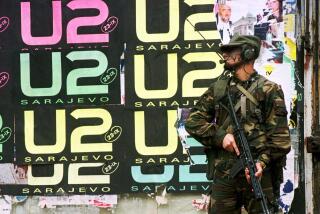History Returns to Haunt the Present : The Balkans: The U.N. must act to keep 1992 from becoming another 1914 for Serbs, Croats and Slavic Muslims.
- Share via
World War I started in Sarajevo in 1914. Today, Sarajevo symbolizes a new world disorder and the impotence, ambivalence and lack of concern of the world.
Our newspapers and television screens bring us images of men, women and children suffering in a beautiful province where, only a few years ago, we admired Olympic competitions underscoring international brotherhood.
Should children be nailed alive to trees in front of their parents? Should women be gang-raped and men tortured mercilessly before being killed? Should soldiers shell buildings housing the aged? We are all bystanders as carnage continues in the former Yugoslavia.
Be they Serbs, Croats or Bosnians, be they orthodox Christians, Catholics or Muslims, all suffer the ravages of war. Some want to shrug the conflict off as “old hatreds” or as “religious wars” but these are only alibis for not intervening in an unambiguous way. Tragically, we are not only witnessing a re-Balkanization of the area with its old hatreds, but also the creation of new hatreds.
The animosities among Serbs, Croats and Muslim Slavs date back to the Austro-Hungarian and Ottoman empires, when foreign rulers sowed distrust to serve their political ends. For example, the Croats protected themselves through allegiance to the Hapsburgs; the Serbs became a buffer between the Turks and the Hapsburg lands. Most ethnic groups saw themselves as victims of an international conspiracy in which some acquired a state and others did not.
The tragedy for all ethnic groups is that the Balkans have ceased to be an area of competition for the superpowers. In 1947, Tito broke with Stalin because he knew the United States would not relinquish to the Soviets its access to the Adriatic. Our interventions today are ambivalent, vague and inefficient in part because superpower rivalry ceased with the Cold War.
To enforce a peace in Yugoslavia, one has to understand history. The United States was the first power to recognize Yugoslavia in 1918, to welcome “a house for all,” even if it meant ignoring the cumbersome marriage between Croats and Serbs. Croats resented that their so-called independence came with a Serbian army. The Croats had fought in the Austro-Hungarian army as enemies of the Serbs and Montenegrins. The Serbs did not forget. During World War II, this old injury was reopened when the Croats fought with Germany. The atrocities of the fascist Croatian Ustashe became assigned to all Croats. Because of these bitter memories, Serbs now glorify the actions of the xenophobic Chetniks, responsible for many of today’s atrocities.
After the war, Tito, like Stalin, laid the foundation for brotherhood and unity by decree. Tito scattered 30% of the Serbs outside Serbia and Montenegro. Tito, again like Stalin, declared that the nationality problem had been solved and Yugoslav unity had been achieved. He penalized anyone who suggested otherwise. In an atheistic state, Tito also equated ethnic origin with religion.
In 1991, when Austria and Germany recognized the independence of Slovenia and Croatia, Serbs felt victimized by the dismemberment of their sovereign state. Political arsonists such as Serbia’s Slobodan Milosevic and Croatia’s Franjo Tudjman ignited old memories and kindled a spirit of retaliation. Serbian leaders called on their 3 million compatriots scattered in other provinces to join them. Serbs suspected that Germany again wanted a “Teutonic belt” from the Baltic to the Adriatic, and they were angered about remaining a land-locked nation. Former Communists now parade as nationalists, not only in Serbia and Croatia but also in Slovakia and Romania.
Another complication stems from American political intellectuals who find it hard to distinguish the good guys from the bad. Because of this, we ignored Croatian territorial designs on Bosnia-Herzegovina. Europeans have their own ambivalent historical agendas.
Most important, Western Europe and the United States have experience in dealing with a Cold War, not a hot one. The West’s silence has encouraged Milosevic and Tudjman to inflame the hatreds of their constituencies. The Croat leader blames the war on the struggle of his free-market economy against a Bolshevik-Serb regime. Milosevic maintains that his is a holy war against a fascist state for the liberation of displaced Serbs. All, including Slavic Muslims, feel marginalized by the West.
The international community has ignored history and its warnings. Now we must worry about the spread of the war to Kosovo, the Jerusalem of Serbia. The Serbs’ emotional investment in Kosovo has prevented them from seeing that the population of Kosovo is now 90% Albanian. An attack on Kosovo and Macedonia could spread the war to Albania, Greece, Bulgaria and Turkey.
The United Nations has given humanitarian aid and imposed sanctions, which have only increased nationalism. The peace-keeping forces are inadequate.
It is time for the United Nations to act more forcefully, even though its charter prevents it from acting intranationally. But the U.N. Charter was written in 1947, and now mass violation of human rights deserves more attention and action than violation of national borders. Unless we act now, the horrible memories of 1992 will become part of the collective memories of Serbs, Croats, and Slavic Muslims alike--transmitted from generation to generation as historical truth, only to sow the seeds for new wars.
More to Read
Sign up for Essential California
The most important California stories and recommendations in your inbox every morning.
You may occasionally receive promotional content from the Los Angeles Times.













